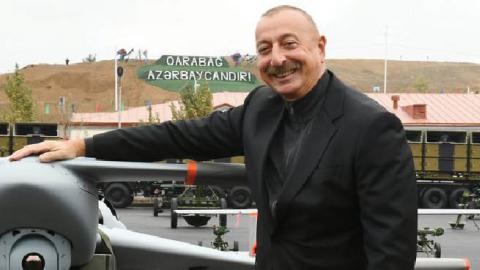A picture is worth a thousand policy briefs. On Oct. 4, Ilham Aliyev, the president of Azerbaijan, mugged for the cameras. Beaming before reporters, he stroked, patted, and put a loving arm around a Harop, a kamikaze drone manufactured by Israel.
Technically classified as a “loitering munition,” the Harop behaves, in the latter stages of its mission, like a cruise missile, crashing into its targets and exploding on impact. In the early stages, however, it functions as a drone, circling high above the battlefield, waiting for targets to emerge. The Harop is well known in Azerbaijan, thanks to the role it played in the victory last year against Armenia.
But it was for Iran’s benefit that Mr. Aliyev organized this photo-op. In recent weeks, Tehran has engaged in a crude campaign of intimidation that included military exercises on Azerbaijan’s frontier—a surprise move that elicited an angry response from Mr. Aliyev. “Why now, and why on our border?” he asked publicly. “There were no such incidents in the 30 years of Azerbaijan’s independence.”
Iranian officials answered by demanding that Azerbaijan end its alliance with Israel. “We do not tolerate the presence and activity against our national security of the Zionist regime, or Israel, next to our borders,” said Hossein Amirabdollahian, the Iranian foreign minister. “And we will carry out any necessary action in this regard.”
Iran has good reason to be worried. Its economy is in shambles, and unemployment is rampant. By contrast, Azerbaijan’s economy is strong, and its army is even stronger, thanks in part to the assistance from Israel, which organized a military airlift to resupply Azerbaijan during the 2020 war with Armenia.
Seen from Tehran, Israeli influence in Baku appears especially ominous because of the extraordinary reach into Iranian society that Azerbaijan enjoys. Ethnic Azerbaijanis, a Shiite Turkic people, form a large portion of Iran’s population, somewhere between 20% and 30%. They are concentrated in the northwest part of the country, on the border with Azerbaijan. Though a major secessionist movement hasn’t developed, discontent is rife, and strong feelings of solidarity with Azerbaijan are often on display.
Read the full article in the Wall Street Journal



















